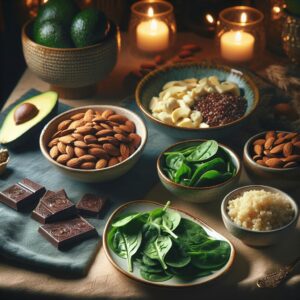Sweet Dreams: The Best and Worst Snacks for Better Sleep
Getting a good night’s sleep is crucial for our overall health and well-being. While many factors contribute to sleep quality, what we eat before bed can play a significant role. Choosing the right snacks can promote relaxation and aid in a restful night, while the wrong ones can lead to discomfort and disrupted sleep.
The Best Bedtime Bites
When it comes to pre-sleep snacks, the goal is to opt for foods that are light, easy to digest, and contain compounds that support sleep.
- Cherries (especially tart cherries): These little fruits are a natural source of melatonin, the hormone that regulates sleep-wake cycles. A small bowl of fresh cherries or a glass of tart cherry juice can be a great bedtime treat.

- Almonds: Rich in magnesium, a mineral known for its muscle-relaxing properties, almonds can help calm your body and mind. They also contain tryptophan, an amino acid that the body converts into serotonin and then melatonin. A small handful is all you need.
- Walnuts: Similar to almonds, walnuts also contain tryptophan and magnesium. They’re also a good source of omega-3 fatty acids, which have been linked to improved sleep.
- Bananas: These potassium and magnesium powerhouses can help relax muscles and promote a sense of calm. They also contain tryptophan.
- Warm Milk: A classic for a reason! Milk contains tryptophan, and the warmth can be soothing. If you’re not a fan of plain milk, a small amount of honey can be added.
- Oatmeal: A small bowl of plain oatmeal can be a good choice. Oats are a source of melatonin and can help stabilize blood sugar levels, preventing nighttime awakenings due to hunger.
- Kiwi: Studies have shown that eating kiwi before bed can improve sleep quality. They contain serotonin, which can help regulate sleep.
What to Avoid Before Bed
Just as some foods can help, others can hinder your sleep. It’s best to steer clear of these before hitting the hay:
- Caffeine: This is probably an obvious one, but any caffeinated beverages or foods (coffee, tea, chocolate, some sodas) should be avoided several hours before bedtime. Caffeine is a stimulant and can keep you awake.
- Heavy, Fatty, or Fried Foods: These take a long time to digest and can cause indigestion, heartburn, and discomfort, making it difficult to fall asleep and stay asleep.
- Spicy Foods: Similar to fatty foods, spicy meals can lead to indigestion and heartburn, especially when lying down.
- Sugary Snacks and Drinks: While a sugar rush might seem appealing, it can lead to a spike and then a crash in blood sugar, potentially disrupting your sleep.
- Alcohol: While alcohol might initially make you feel drowsy, it can disrupt your sleep cycle later in the night, leading to fragmented and less restorative sleep.
- High-Protein Meals: While protein is essential, a large, protein-heavy meal right before bed can be difficult for your body to digest, keeping your digestive system active when it should be winding down.
- Citrus Fruits: For some, the acidity in citrus fruits can cause heartburn or acid reflux, especially when lying down.
Tips for Success
- Timing is Key: Aim to have your last substantial meal at least 2-3 hours before bed. If you need a snack, keep it small and consume it about 30-60 minutes before you plan to sleep.
- Portion Control: Even with the “best” snacks, moderation is important. Overeating anything before bed can lead to discomfort.
- Listen to Your Body: Everyone is different. Pay attention to how certain foods affect your sleep and adjust your choices accordingly.
By making mindful choices about your pre-bedtime snacks, you can set yourself up for a more peaceful and restorative night’s sleep. Sweet dreams!
